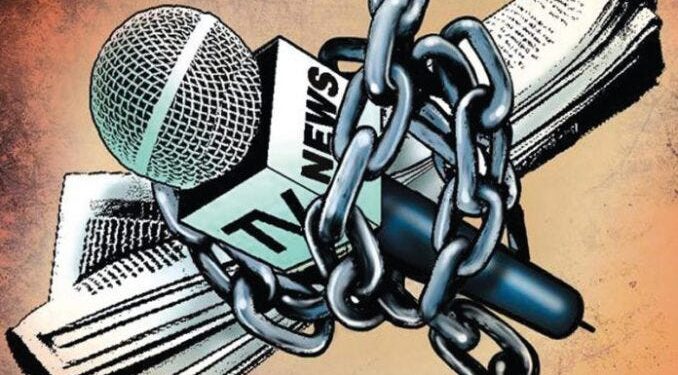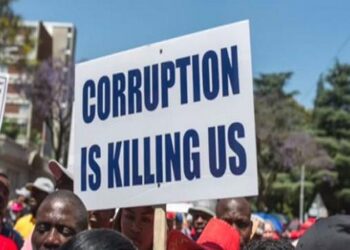Introduction
In today’s world, where terrorism transcends borders and threats often emerge without warning, the relationship between the media and the state’s security apparatus is both critical and complex. At the heart of this dynamic lies the difficult question: when and how should sensitive information be reported? In the context of counter-terrorism, this dilemma becomes even more pronounced, especially in democracies like Ghana, where media freedom and national security must coexist.
The relationship between the state and the media—particularly in democratic societies—has always been characterised by a delicate balance. On the one hand, the state has a legitimate mandate to ensure national security and protect the public. On the other hand, the media plays a crucial watchdog role, holding power to account and informing the citizenry. This balance becomes increasingly strained in the context of terrorism, where the stakes are high and the consequences of information leaks or misreporting could be dire.
This article explores the delicate balance between the need for timely and transparent information dissemination and the imperatives of state security. Using Ghana as a case study, we examine how polarized political discourse, media practices, and security protocols intersect in ways that can either strengthen or undermine counter-terrorism efforts.
Counter-Terrorism
Counter-terrorism, broadly defined, refers to the policies, strategies, and practices adopted by states and international actors to detect, prevent, and respond to terrorism. According to Wilkinson (2011), counter-terrorism encompasses a range of activities including intelligence gathering, law enforcement, military operations, and legal reforms.
Schmid (2011) provides a robust academic foundation for understanding counter-terrorism, framing it as both a reactive and proactive set of measures. His work emphasizes that effective counter-terrorism is not solely about eliminating terrorists, but about addressing the broader ecosystem in which terrorism thrives—including political, social, and economic grievances that may foster radicalisation.
More importantly, counter-terrorism efforts must be aligned with legal norms and human rights standards, lest they undermine the very democratic values they seek to protect.
The literature identifies multiple dimensions of counter-terrorism: preventive (e.g., intelligence operations), defensive (e.g., airport security), responsive (e.g., crisis management), and long-term (e.g., deradicalisation programs). The effectiveness of any counter-terrorism strategy often hinges on the seamless coordination between various arms of the state and its ability to maintain public trust through strategic communication (Bakker, 2006).
Role of the State and its Security Apparatus
The state, through its security apparatus—comprising intelligence agencies, law enforcement bodies, the military, border control, and judicial mechanisms—is tasked with ensuring the protection of its citizens, institutions, and sovereignty. In counter-terrorism, this role is both tactical and strategic. Security institutions such as the police, military, and intelligence services collect and analyse information, monitor potential threats, and neutralise imminent dangers.
However, as Amy Zegart (2007) argues, the very structure of these institutions—particularly in democratic settings—can be both a strength and a weakness. Bureaucratic silos, turf wars, and legislative constraints often inhibit timely action.
In conclusion, the security apparatus’ effectiveness is closely tied to public cooperation and the state’s ability to communicate threats without causing panic. It also has a responsibility to respect democratic principles, including the rule of law, human rights, and freedom of the press. This creates a tension: while some information must be withheld to safeguard operations, transparency is essential for maintaining credibility and public confidence.
Journalism: Traditional and Non-Traditional Forms
Journalism has long been heralded as the “Fourth Estate” in democratic societies, playing a vital role in informing the public, scrutinizing power, and shaping public discourse. Traditionally, journalism is guided by core principles: accuracy, independence, impartiality, humanity, and accountability (Ethical Journalism Network). Newsrooms follow editorial protocols, fact-checking mechanisms, and legal frameworks such as libel and defamation laws.
According to Kovach and Rosenstiel (2007), journalism’s primary purpose is to provide citizens with accurate and relevant information to make informed decisions.
With the advent of digital technology, non-traditional journalism has emerged. This includes citizen journalism, blogging, independent podcasts, and content dissemination via social media platforms. Now, anyone with a smartphone and internet access can report events in real time, bypassing traditional gatekeeping structures. While these platforms have democratised information, they also pose challenges for verification, editorial accountability, and information security.
Academic literature warns of the potential for misinformation and sensationalism, particularly in crisis contexts (Allan, 2013). This evolution has blurred the lines between professional journalism and public commentary, making the media-security relationship even more complex in matters of national security.
When Press Freedom and National Security Expediency are at Odds
Press freedom is enshrined in Ghana’s Constitution and recognised as a pillar of democratic governance. However, the exercise of this freedom becomes contentious in times of crisis. National security agencies often seek to control the narrative to prevent public panic, preserve operational secrecy, or protect national interests. This control, however, may be perceived as censorship by the media and civil society.
The media, for its part, may pursue stories that uncover state shortcomings or question the legitimacy of security operations. These actions, while crucial for transparency, can conflict with the immediate objectives of national security.
This tension is not unique to Ghana. Globally, the debate continues over how much information is too much during a security crisis. The key challenge lies in striking a balance between the public’s right to know and the state’s duty to protect.
Ghana’s Polarised Political Landscape and Its Impact on National Security Communication
While Ghana is widely regarded as a beacon of democracy in West Africa, its political landscape is not without challenges. A deeper observation of the country’s democratic structure—particularly within Parliament and the public communication sphere—reveals a duopolistic party system dominated by the National Democratic Congress (NDC) and the New Patriotic Party (NPP). These two parties alternately form the government and opposition, and their rivalry permeates nearly every facet of public discourse.
In theory, a multiparty democracy should encourage pluralism, policy debates, and broad consensus on matters of national interest. However, in practice, Ghana’s political duopoly has cultivated a culture of bipartisan antagonism that often trumps objective dialogue. Even on matters of national security—where unity and coherence should be paramount—the communication officers and spokespersons of these two parties routinely issue conflicting statements, often driven by political expediency rather than factual integrity or strategic prudence.
This polarisation significantly affects how the public processes security-related information. For instance, when the state security apparatus issues a terror alert or announces new security measures, the communication is swiftly interpreted through partisan lenses. Opposition parties may accuse the government of exaggeration or using fear to distract from domestic failings, while the ruling party might dismiss opposing views as irresponsible or even unpatriotic.
The media—tasked with serving the public interest—is often caught in this crossfire. Press outlets aligned with either party amplify partisan interpretations, thereby sowing doubt, confusion, or panic among the populace. This disunity not only weakens public trust in security communications but can also undermine compliance with critical national directives in times of crisis.
This dynamic is particularly dangerous in a context where terrorist groups thrive on exploiting societal fractures. Polarisation provides fertile ground for misinformation, heightens suspicion between citizens and the state, and detracts from the coordinated effort required to detect, deter, and respond to terrorist threats.
Recommendations: Enhancing Coordination between the Media and State Security in the Context of Heightened Terror Threats in Ghana
1. Establish a National Framework for Media-Security Coordination
The government should develop a national policy framework that clearly defines protocols for media engagement during security operations. This framework should be developed in collaboration with the Ghana Journalists Association (GJA), security sector representatives, civil society organisations, and legal experts to ensure it reflects democratic values and operational realities.
2. Create Joint Communication Task Forces
During periods of high threat or ongoing operations, a joint communication team comprising representatives from the National Security Secretariat, the Information Ministry, and accredited media outlets should be formed. This body would facilitate real-time information sharing, prevent the spread of misinformation, and issue unified statements to the public.
3. Provide Regular Briefings to the Media
The security apparatus should proactively engage the media through periodic briefings on general threat assessments and guidelines on responsible reporting during crises. Transparency builds trust—and pre-emptive communication can significantly reduce speculative or sensationalist coverage that may endanger operations.
4. Develop Crisis Reporting Guidelines for Journalists
In partnership with journalism training institutes, develop and disseminate guidelines for reporting on terrorism and national security issues. These guidelines should cover ethical dilemmas, verification standards, use of sensitive imagery, and the risks of inadvertently aiding terrorist propaganda.
5. Promote Legal and Ethical Awareness for Journalists and Security Agents
Workshops and trainings should be held regularly to deepen understanding of the legal limits and responsibilities of both journalists and state actors. Journalists must understand what constitutes sensitive information, while security agents must be reminded of the importance of press freedom and lawful engagement with the media.
6. Monitor and Counter Disinformation and Extremist Narratives Online
Invest in digital monitoring tools and public-private partnerships to detect and counter extremist narratives, especially on social media. Journalists can be supported to play a proactive role in debunking misinformation and disinformation that may incite fear or polarize communities.
7. Foster a Bipartisan National Security Communication Charter
Parliament, under the leadership of the Speaker, should convene both majority and minority leaders to develop a bipartisan communication charter on national security. This charter should commit both parties to a unified front in public communication during times of heightened national alert. While policy differences may persist, certain red lines—such as avoiding contradictory messaging on terror threats—must be respected in the national interest.
8. Sensitize Political Communicators on the Risks of Partisan Security Narratives
Through the National Commission for Civic Education (NCCE) or a bipartisan parliamentary initiative, regular briefings and training should be conducted for party communicators on how to responsibly engage with sensitive national security information. Understanding the consequences of politicizing security matters is essential for maintaining public trust and national stability.
Conclusion
The interplay between the media, political actors, and the state’s security apparatus is a defining feature of democratic resilience. As Ghana faces the dual challenge of rising insecurity and deepening political polarisation, deliberate steps must be taken to protect democratic values without compromising national security.
Counter-terrorism efforts thrive in an environment of trust, coherence, and strategic communication. To this end, the media must report ethically and factually; the security agencies must act with transparency and professionalism; and political leaders must rise above partisan instincts when national security is at stake.
Only through this shared commitment can the question “To report or not to report?” be answered wisely, and in the best interest of both freedom and safety.
References:
Schmid, A. P. (2011). The Definition of Terrorism. In The Routledge Handbook of Terrorism Research. Routledge.
Bakker, E. (2006). Jihadi terrorists in Europe: their characteristics and the circumstances in which they joined the jihad. Clingendael Institute.
Wilkinson, P. (2011). Terrorism Versus Democracy: The Liberal State Response. Routledge.
Allan, S. (2013). Citizen Witnessing: Revisioning Journalism in Times of Crisis. Polity Press.
Kovach, B., & Rosenstiel, T. (2007). The Elements of Journalism. Three Rivers Press.
Zegart, A. B. (2007). Spying Blind: The CIA, the FBI, and the Origins of 9/11. Princeton University Press
Ethical Journalism Network. Ethics 101 : The Five Core Values of Journalism. https://ethicaljournalismnetwork.org/5-core-values-of-journalism
Le Monde (2025). Au Burkina Faso, trois journalistes arrêtés réapparaissent réquisitionnés au front. https://www.jeuneafrique.com/1675431/politique/au-burkina-faso-trois-journalistes-arretes-reapparaissent-requisitionnes-au-front/































